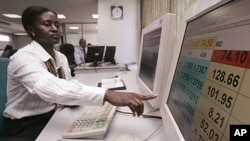The Kenyan currency has been trading this week at more than 100 shillings to the U.S. dollar, this compared to a rate of about 80 shillings to the dollar in January.
Inflation is soaring at more than 16 percent, and the Bloomberg financial news agency says the shilling is now the world's worst-performing currency.
At a marketplace in downtown Nairobi, shop owners are starting to feel the strain, as prices for basic goods and materials rise.
"Right now ... I don't have customers, and in case I have one, the amount I put in, I get less," says Bernard Ndika, whose business of selling handicrafts mainly to passing tourists is not good.
"I bought when the dollar was a bit low, and now it's gone up, which means I have to increase my prices," he says.
Robert Shaw, an independent economic analyst in Nairobi, says the shilling was initially driven down by fundamental factors that included the rising price of imported oil and other commodities.
But the recent acceleration in the currency's fall, he says, is largely driven by speculation and fear.
"What we're seeing now is a sort of panic, a frenzy, and it is probably getting to a stage where it's defying fundamentals," he says.
Central bank blames commercial counterparts
Kenya's central bank has been inconsistent in its response to the issue and has blamed commercial banks for hoarding foreign currency.
The central bank's regulator started by selling foreign currency directly to the country's commercial banks, in the hope that it could be lent out to importers struggling with the high cost of foreign goods.
But in a statement this week, central bank Governor Njuguna Ndungu'u said that strategy had failed due to lack of support from the commercial banks.
Now the bank is proposing selling foreign currency, likely at a discounted rate, directly to targeted sectors of the economy, like oil importers. Shaw says this, also, is probably a mistake.
"Whether that will create a distortion in the market is difficult to tell," he says. "[They're] basically going back to a two-tier currency rate, which most countries dispensed with over the years because they just don't work."
Campaign politics cash grab?
Back in the market stalls in Nairobi, some Kenyans are starting to speculate that hoarding of U.S. dollars is a money grab by the country's rich and powerful in preparation for Kenya's 2012 elections.
"We on the ground see there is a cartel that is working due to the election of 2012, so there's now speculation going on," says art dealer Harrison Onyango. "There is a game being played by creatures who did economics and they now know how to manipulate it and bring the beef back to their bank account."
Other countries in East Africa are struggling with the same fundamental challenges as Kenya and have also watched their currencies plummet. Uganda's shilling has fallen 19 percent against the dollar this year, while Tanzania's has also sunk to a 17-year low.




